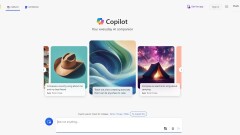Guess what's killing those spreadsheets? Yes, it's artificial intelligence. Plus, Microsoft's new take on Copilot, USB flashdrives seem to be on their way out, and seven other things that happened in technology this past month and how they'll impact your clients and your firm.
1. AI means the death of spreadsheets

Why this is important for your firm and clients: He's right and some of the accounting tools I've
2. Google I/O 2025: From research to reality

Why this is important for your firm and clients: It's worth reading the entire post referenced above because Google has announced so many different AI-leveraged technologies that the only way to see what will impact your business is to dig into the details. Filmmakers and creators especially will be impressed. But so will small-business owners and consumers who will see this technology offering many ways to improve productivity from writing emails to getting search results faster and more accurately.
3. A new Microsoft 365 Copilot app

Why this is important for your firm and clients: There's a massive change happening in how Office products are to be used and these are the initial steps towards that. Instead of launching applications within Office (and similar platforms) we'll instead be using interfaces similar to ChatGPT where users explain what they're trying to do ("write a proposal" or "do an analysis" or "create a presentation") and the right applications will be chosen for us, running behind the scenes, taking requests from users and then creating results.
4. Klarna hiring back humans after going all-in on AI

Why this is important for your firm and clients: This is a crazy story mainly because — as I've
5. Still 'Googling it' rather than using AI chatbots

Why this is important for your firm and clients: It's true that AI chatbots are not yet taking over search this year. But watch as this number grows. It's only common sense: Why sort through dozens of websites and articles for an answer to a question when AI can summarize it all for you (as long as it's accurate)? I'm expecting to see these chatbots power search in the next few years. How does this impact SEO? People are still trying to figure this out and when I learn, I'll share!
6. Cybersecurity: Aware, but not acting

Why this is important for your firm and clients: Spoiler alert: CrowdStrike offers tools to help address some of the concerns noted above. But they're not misleading people with these survey results. Cyber threats continue to be a disruptive and expensive part of running a business and these threats are only becoming more pervasive — and powerful — thanks to AI tools. Yes, you should be investing in a suite of cybersecurity products to protect your business. More important, you should be getting continuous training because most cyber breaches are caused by employees.
7. Epicor expands AI for supply chain industries

Why this is important for your firm and clients: Epicor is very popular manufacturing and distribution ERP software that's used by both big and midsized enterprises. I attended this conference (and will write about it separately) and found their AI offerings to be exciting and consistent with what other good software companies are doing. Whether you're using Epicor or not, my advice is to find out what your software vendor is doing with AI and how it will impact your business so that you can determine its ROI. Attending a conference like this is worthwhile. (Disclaimer: Epicor is a client of my company. I have not been compensated to write this. This news information is publicly available.)
8. Talkdesk launches AI platform for utilities support

Why this is important for your business: Talkdesk continues to introduce new products and services aimed at industry groups like utility providers. The features this product includes are important for those in that industry, yet have broader appeal to other industry groups as well. (Disclaimer: Talkdesk is a client of my company. I have not been compensated to write this. This news information is publicly available.)
9. Robots in the warehouse

Why this is important for your firm and clients: Robots like these will ultimately conduct cycle counting, stock check and safety analysis of products in a warehouse, just as people are doing now. This will be a huge advantage to my clients that can't find enough hourly warehouse workers, or workers who are conscientious enough to track quantities in this manner.
10. Alternatives to USB flash drives

Why this is important for your firm and clients: I carry around a handful of USB flash drives and on my list of 100 top problems of the day, they're not on it. The drives have plenty of space to copy the kinds of files I need them for and the copy/paste process usually takes a few seconds. They're inexpensive, portable and adaptable to pretty much any device. I can't imagine carrying around a heavier, more expensive external hard drive, I'm not sure how to use microSD cards and have you tried saving/downloading from the cloud? It's way more time-consuming. Bottom line (and at least for me) I'm not seeing USB flash drives become extinct anytime soon.





